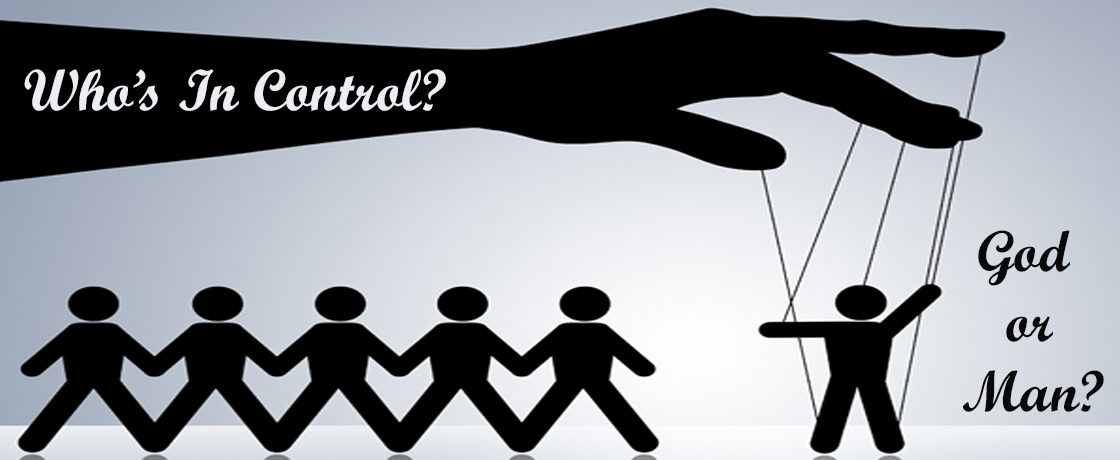Who’s in Control? God or Man?
Who’s in Control?
God or Man?
God is utterly sovereign, but His sovereignty never functions to mitigate human responsibility.
Human beings are morally responsible creatures, but their moral responsibility never functions to make God absolutely contingent. Human beings choose to believe and disbelieve, to obey and disobey, and to reject and accept; these things are morally significant actions in the Scripture. However, their moral responsibility never functions to make God secondary, absolutely contingent, dependent upon us in some way, or merely a responder.
Human responsibility never reduces God’s sovereignty.
Both theology and philosophy wrestle with the tension which exists between God’s sovereignty and human responsibility. The question is: If God is absolutely sovereign, in what sense can we meaningfully speak of human choice, of human will? It is doubtful that finite human beings can cut the Gordian knot concerning God’s sovereignty and human responsibility.
This problem has generated, across the centuries of the church, a lot of reflection about how to think about this. It means God is so sovereign that He stands behind both good and evil, but He stands behind good and evil asymmetrically, That is, He does not stand behind good and evil in exactly the same way.
God stands behind good in such a way that the good is always traceable to Him. He stands behind evil in such a way that it never escapes the outermost boundaries of His sovereignty, but the evil is never
chargeable to Him. The evil is chargeable to the secondary causalities, to the secondary causes.
How Do We Put The Two Together?
The fact that they belong together is sometimes called compatibilism, which is merely the assertion that both of these propositions are mutually compatible.
Compatibilism does not pretend that it can show exactly how they are compatible. It merely shows that you can make a good case from biblical evidence and broader considerations for showing that there is nothing about these two propositions that makes them necessarily incompatible. It acknowledges how much we do not know, but it argues that: We can know enough to believe both propositions without committing intellectual suicide.
Three Situations Where This Is Evident
Genesis 50:19–20
After their father dies, Joseph’s brothers approach him, afraid that perhaps he will take the departure of their father as a signal that he take revenge upon the brothers for having sold him into slavery so many decades earlier. Joseph responds, “You intended what you did for evil, but God intended it for good.” It does not say, God’s intention was all messed up because of you.
Neither does it say that God wasn’t paying much attention, so that’s what happened. Or, He’s such a good chess player that after the fact, He came in and corrected your mess.
Rather, in one and the same event, we’re told, God intended it for good and you intended it for evil. God’s sovereignty is preserved and so also is human responsibility. The fact that God was doing something good in this miserable event, does not in any sense minimize the accountability of the brothers for the evil that they were doing. God is not withdrawn from the situation.
Isaiah 10:5ff and following.
God addresses the Assyrians through the prophet, and says, Woe to the Assyrians. After all God’s work in using Assyria to chasten His own people, Jerusalem, He says, I will punish the king of Assyria for the willful pride of his heart and the haughty look in his eyes. But that does not mean that the Assyrians (or later, the Babylonians), because they’ve been tools in the Lord’s hand, are, therefore, somehow exempt from any responsibility.
They’re still held accountable and punished by God, in turn, for what they did.
Acts 4:24–28.
Here, the first whiff of persecution has broken out against the church. Peter and John return to the Christians who have gathered. The instant response is prayer in the words of Psalm 2. They begin by confessing God’s sovereignty.
Herod and Pontius Pilate met together with the Gentiles and did what God’s power and will had decided beforehand should happen. If God is not in control of the cross, then it becomes an accident in the flow of history. How do you square that with all of the antecedent Scriptures that have Christ as the Passover Lamb and the Great Sacrifice? Does that mean that Pilate and Herod are all excused? No, v27, is still there. God’s sovereignty in bringing about the events of the cross does not mitigate one inch of the offenses that brought Christ there.
God’s sovereignty and man’s responsibility have to be believed by any thinking Christian or sooner or later
what you destroy is the cross. Both propositions, which are both true and are both needing to be confessed, are related to what the Bible says about God.

